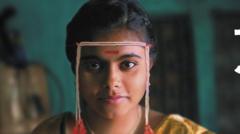In a significant departure from the mainstream, 2024 has emerged as a remarkable year for Indian cinema, spotlighting the empowering stories crafted by female filmmakers.
Feminism Fuels Renaissance of Indian Cinema in 2024

Feminism Fuels Renaissance of Indian Cinema in 2024
As Bollywood falters, Indian women's films take center stage globally, showcasing poignant narratives.
Throughout 2024, while Bollywood struggled with fluctuating fortunes, a wave of independent films directed by women captured audiences' attention both in India and internationally. Leading this trend is Payal Kapadia's groundbreaking film "All We Imagine As Light," which snagged the prestigious Grand Prix at the Cannes Film Festival in May. The film's remarkable journey did not stop there; it has also clinched accolades as Best International Film from notable organizations such as the New York Film Critics Circle and the Toronto Film Critics Association, alongside earning two Golden Globe nominations, including one for Kapadia as Best Director.
Joining this movement, Shuchi Talati's "Girls Will Be Girls" garnered attention at the Sundance Film Festival, bagging two awards, while Kiran Rao's "Laapataa Ladies" resonated well with audiences, remaining on the Netflix India top 10 list for over two months and standing as India’s official Oscar entry—a decision that stirred some debate. Additionally, British-Indian filmmaker Sandhya Suri's gripping Hindi film "Santosh" was selected as the UK's official Oscar submission.
This surge in recognition begs the question: is this moment a mere anomaly or the dawning of a new paradigm in global cinema? Film critic Shubhra Gupta attributes the success not only to chance but to years of dedication behind the scenes, emphasizing that these films are the fruits of long-term efforts finally coming to fruition.
The films' global resonance is rooted in their rich storytelling and exploration of themes such as loneliness, identity, resilience, and gender dynamics. For instance, "All We Imagine As Light," produced in Hindi, Marathi, and Malayalam, follows the lives of three migrant women in Mumbai, navigating their personal relationships against a backdrop of socio-political challenges. Kapadia artfully conveys complex emotions, pointing out the pervasive political implications surrounding love and choice for women in her country.
In contrast, "Girls Will Be Girls" investigates adolescent female experience and rebellion within a boarding school setting, highlighting intergenerational conflict. According to Gupta, such authentic and sensitive representations of women's realities have been noticeably lacking in India's mainstream cinema, paving the way for new narratives.
"Laapataa Ladies," a satirical take featuring two brides mistakenly swapped on a train, critiques patriarchal norms while providing audiences with a light-hearted yet incisive commentary on gender roles. Despite its lukewarm box office performance, the film garnered a warm reception for its fresh perspectives.
Meanwhile, "Santosh," an intense thriller addressing violence against women, exemplifies a landmark cross-national collaboration with a predominantly female crew. The film is co-produced across several countries, indicating a shift toward more inclusive and diverse storytelling in cinema that transcends cultural boundaries, as highlighted by the lead actress Shahana Goswami.
Even within Bollywood, female-centred films are finding audiences. "Stree 2," a horror-comedy focused on women's empowerment, emerged as a blockbuster, while Sanjay Leela Bhansali’s Netflix series "Heeramandi" drew significant viewer interest, addressing significant historical societal issues.
Thus, the developments in 2024 showcase a pivotal moment for the Indian film industry, underscoring a universal appetite for diverse narratives and the increasing prominence of women's voices. As the industry continues to adapt and evolve, there is growing hope that this momentum can enhance global opportunities for Indian cinema, leading to a more inclusive and equitable representation in storytelling.
Joining this movement, Shuchi Talati's "Girls Will Be Girls" garnered attention at the Sundance Film Festival, bagging two awards, while Kiran Rao's "Laapataa Ladies" resonated well with audiences, remaining on the Netflix India top 10 list for over two months and standing as India’s official Oscar entry—a decision that stirred some debate. Additionally, British-Indian filmmaker Sandhya Suri's gripping Hindi film "Santosh" was selected as the UK's official Oscar submission.
This surge in recognition begs the question: is this moment a mere anomaly or the dawning of a new paradigm in global cinema? Film critic Shubhra Gupta attributes the success not only to chance but to years of dedication behind the scenes, emphasizing that these films are the fruits of long-term efforts finally coming to fruition.
The films' global resonance is rooted in their rich storytelling and exploration of themes such as loneliness, identity, resilience, and gender dynamics. For instance, "All We Imagine As Light," produced in Hindi, Marathi, and Malayalam, follows the lives of three migrant women in Mumbai, navigating their personal relationships against a backdrop of socio-political challenges. Kapadia artfully conveys complex emotions, pointing out the pervasive political implications surrounding love and choice for women in her country.
In contrast, "Girls Will Be Girls" investigates adolescent female experience and rebellion within a boarding school setting, highlighting intergenerational conflict. According to Gupta, such authentic and sensitive representations of women's realities have been noticeably lacking in India's mainstream cinema, paving the way for new narratives.
"Laapataa Ladies," a satirical take featuring two brides mistakenly swapped on a train, critiques patriarchal norms while providing audiences with a light-hearted yet incisive commentary on gender roles. Despite its lukewarm box office performance, the film garnered a warm reception for its fresh perspectives.
Meanwhile, "Santosh," an intense thriller addressing violence against women, exemplifies a landmark cross-national collaboration with a predominantly female crew. The film is co-produced across several countries, indicating a shift toward more inclusive and diverse storytelling in cinema that transcends cultural boundaries, as highlighted by the lead actress Shahana Goswami.
Even within Bollywood, female-centred films are finding audiences. "Stree 2," a horror-comedy focused on women's empowerment, emerged as a blockbuster, while Sanjay Leela Bhansali’s Netflix series "Heeramandi" drew significant viewer interest, addressing significant historical societal issues.
Thus, the developments in 2024 showcase a pivotal moment for the Indian film industry, underscoring a universal appetite for diverse narratives and the increasing prominence of women's voices. As the industry continues to adapt and evolve, there is growing hope that this momentum can enhance global opportunities for Indian cinema, leading to a more inclusive and equitable representation in storytelling.





















